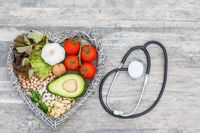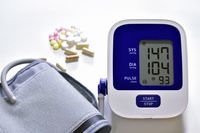9 Common Signs You Are Vitamin Deficient
A well-balanced diet is crucial for your overall health. On the other hand, a diet lacking in essential nutrients can lead to unsightly symptoms. Keep reading to learn about the ten common signs of vitamin deficiencies and how to improve your overall diet.
more10 Ways to Improve Your Cholesterol Levels
Did you know that one in three US adults have high cholesterol? Although cholesterol serves many important functions for the body, including keeping the walls of your cells flexible and aiding in hormone production, too much cholesterol can create health problems. High levels of low-density lipoprotein (LDL) can lead to clogged arteries, heart attacks, and kidney failure. This article provides ten tips to increase your “good” HDL cholesterol and lower your “bad” LDL cholesterol.
moreBenefits of Eating Vegetarian Twice a Week
Do you have trouble going without meat for a day? New science suggests you don’t have to swear off meat for good to reap many of the health benefits of being a full-time vegetarian. Going vegetarian for just two days a week can help reduce your risk of heart disease and other chronic conditions. Keep reading for 7 benefits of eating less meat throughout the week.
more5 Ways Mindfulness Meditation is Good for Your Health
Mindfulness meditation is a practice that teaches you to slow down your thoughts and focus your attention on the present moment. It has been found to be an effective tool for relieving stress and boosting overall happiness. It is also very simple to practice: take a seat, pay attention to your breath, and when your attention wanders, return. Keep reading to learn more about the physical and psychological benefits of mindfulness meditation.
moreHow to Heal Your Food Sensitivities
Do you have trouble eating certain foods? Today, food sensitivities affect more than 100 million people worldwide. Unfortunately, food intolerances can be difficult to pinpoint and painful to manage. Symptoms of food sensitivity include nausea, stomach pain, gas, cramps, bloating, heartburn, and brain fog. If you are struggling with digestive symptoms, follow these six tips to start healing your food sensitivities.
moreBenefits of Drinking 8 Glasses of Water a Day
Did you know that roughly 60% of the human body is water? Drinking enough water every day is crucial to your health and supports almost all body functions. Most people get enough fluids from foods and beverages, but many are chronically dehydrated. While there is no set daily amount of water that a person should drink, we recommend 8 glasses of water for the average person. Here are some reasons why your body needs water:
more7 Benefits of Getting Outside for 15 Minutes a Day
There are so many ways you can take advantage of the benefits of nature. Getting outside is not only important for managing your circadian rhythm, but it can also improve your overall health. Keep reading for seven reasons why you should get outside.
more21 Facts About Breast Cancer
Breast cancer is the most common cancer in American women. There are over 3.1 million breast cancer survivors in the United States, including those who are still being treated and those who have completed treatment. To raise awareness about breast cancer, here are 21 facts you should know.
moreHow to Reduce Your High Blood Pressure
Nearly half of adults in the United States have high blood pressure. High blood pressure occurs when the force of blood flowing through your blood vessels is consistently too high, causing your heart to work harder to pump blood. Over time, high blood pressure can cause blood vessel damage that leads to heart disease, kidney disease, and stroke. Keep reading for ten tips on how to reduce your blood pressure.
more21 Tips for Weight Loss at Home
If your doctor recommends it, there are many ways to safely lose weight! The following 21 tips can help you reduce your appetite and improve your metabolic health.
more10 Signs You Need to Have Your Thyroid Checked
About 1 in 8 women will experience a problem with their thyroid in their lifetime. Your thyroid is a small gland in your neck that produces thyroid hormones, which are responsible for regulating your metabolism, heartbeat, temperature, and mood. Here are 10 signs that you need to have your thyroid checked by your doctor.
more7 Ways to Fight Spring Allergies
Spring allergies can be a pain to manage. From itching to sneezing, it can be tough to catch a break! Luckily, there are many steps you can take to minimize the severity of your symptoms. Keep reading for seven ways to fight spring allergies.
more10 Ways to Boost Your Testosterone Levels Naturally
Testosterone is the most important male sex hormone in the body. Low testosterone can reduce your sex drive, lead to fewer erections, and even infertility. While testosterone levels naturally decline as a person ages, there are many ways to naturally increase your testosterone levels.
moreEverything You Need to Know About Low Dose Naltrexone
Low-dose Naltrexone (LDN) is safe, non-toxic, and inexpensive therapy being used to treat patients with chronic pain, autoimmune diseases, CNS diseases, and certain cancers. Before you speak with your physician, learn more about the benefits of low dose naltrexone and whether it could be a good option for you.
more10 Ways to Reduce Your Stress Levels
It’s easy for stress to sneak up on you. Today, 70% of adults in the United States say they feel stress or anxiety on a daily basis. Between busy work schedules and modern family life, many people are searching for ways to bring short-term stress relief. While you can’t always control your circumstances, here are 10 tips to lower your stress levels.
moreHaving Trouble Sleeping? Try These 10 Remedies
Chronic sleep deprivation can lead to numerous health problems, including diabetes, high blood pressure, and depression. According to a recent Harvard study, as many as one in four adults suffer from mild insomnia. To get your sleep schedule back on track, consider trying these ten home remedies.
moreHow to Effectively Reduce IBS Symptoms
Many patients struggle with stomach symptoms for many years without a diagnosis. Irritable bowel syndrome (IBS) is a common disorder of the large intestine that affects up to 35 million Americans. Symptoms of IBS include cramping, diarrhea, excessive gas, bloating, constipation, and stomach pain. While IBS is most common in patients over the age of 30, it can occur in patients of any age. Adopting the following strategies can help you treat and manage this common condition.
more21 Ways to Eat Healthier Today
Eating healthy does not have to be a chore. At Central Drugs, we are here to help you fine-tune your diet to ensure you are getting the nutrition you need. Eating a healthy and balanced diet can help you live a longer, healthier, and happier life. To improve your diet, follow these 21 nutrition recommendations. If you would like to schedule a free nutrition consultation with one of our friendly pharmacists, please click here.
more10 Immune-Boosting Supplements to Add to Your Diet
Your immune system is constantly defending your body against pathogens, including viruses, toxins, and bacteria. In addition to following a healthy diet and getting enough sleep and exercise, supplements can be a great way to support an overall healthy lifestyle.
moreWhat Should You Know About Low Testosterone?
Testosterone is a hormone that is mainly produced in men and can affect a man’s appearance, sexual development, sex drive, muscle and bone mass, and mood. While testosterone production naturally decreases with age, abnormally low levels can lead to a wide range of symptoms.
more7 Benefits of Glutathione for Your Body
What is Glutathione?
Glutathione (GSH) is a naturally occurring tri-peptide amino acid that is the second most abundant molecule in the body. Often referred to as the “Master Antioxidant,” Glutathione supports cellular health, fights free radicals, and helps eliminate toxins from the body. It also aids in immunity, detoxification, energy, aging, and your ability to guard against disease.
moreHow to Reduce Your Risk of Heart Disease
Each year, approximately 655,000 Americans die from heart disease, which is equivalent to nearly 1 in every 4 deaths. Since cardiovascular disease (CVD) is the leading cause of mortality for men and women in the United States, it is important to educate yourself on how to eliminate key risk factors and make healthy lifestyle choices.
moreHow Sex Hormones Affect Your Heart Health
Hormones affect nearly every tissue or organ system in the body, including your cardiovascular system. To learn more about sex hormones and their impact on your heart health, keep scrolling down.
moreEverything You Need to Know About BHRT for Menopause
What is Bioidentical Hormone Replacement Therapy?
Bioidentical hormones have the same chemical structure as hormones made by the human body, but they are derived from plants. BHRT comes in a variety of forms, including creams, injections, implanted pellets, patches, and gels.
more7 Benefits of BHRT for Andropause
What is Bioidentical Hormone Replacement Therapy?
BHRT is an alternative to synthetic hormones that have the exact chemical and molecular structure as the hormones your body produces naturally.
more
























